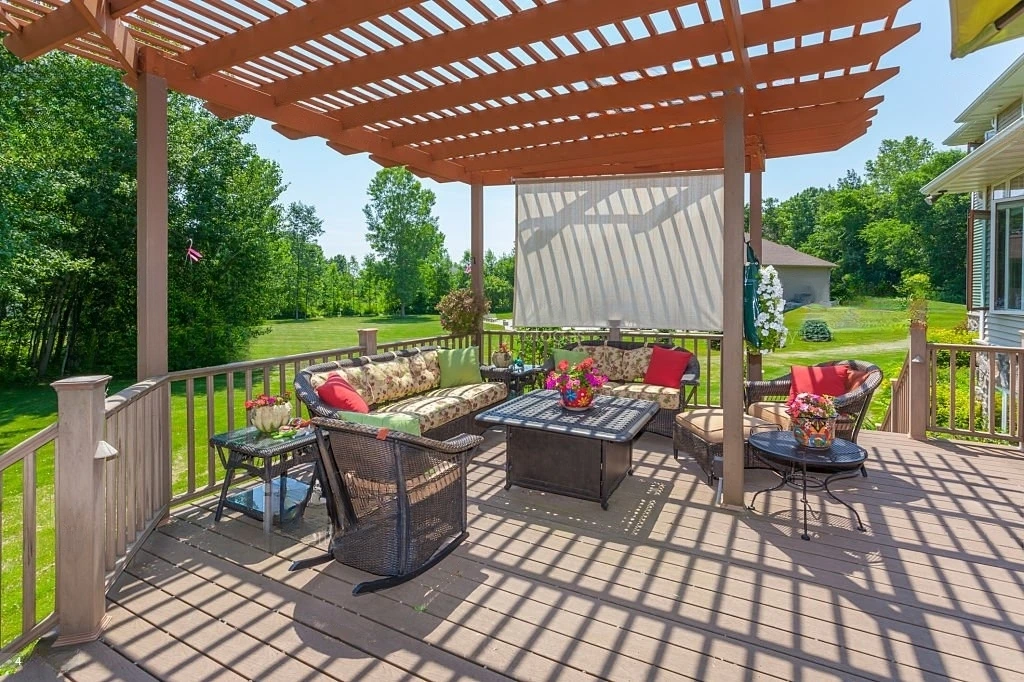Patio pergolas and modern pergola have become increasingly popular among homeowners who want to add attractive, functional outdoor living spaces. However, many people hesitate to invest in a pergola because they still determine the cost. In this article, we will explore the question, “Are pergolas expensive?” and provide you with all the information you need to decide whether a pergola is a suitable investment for your home.
Firstly, it’s important to note that the cost of a pergola can vary greatly depending on several factors. These factors include the size of the pergola, the materials used, the complexity of the design, and the labor costs involved in the installation. Generally, a basic pergola made of wood or vinyl can cost anywhere from a few hundred to a few thousand dollars. On the other hand, a more complex or larger pergola made of high-end materials such as aluminum or steel can cost upwards of $10,000 or more.
While pergolas can undoubtedly be a significant investment, they also offer some benefits that can make them well worth the cost. For one, they provide shade and protection from the sun, allowing you to enjoy your outdoor space even on the hottest days. Additionally, they can add value to your home and make it more attractive to potential buyers if you decide to sell.
While pergolas can certainly be an investment, they offer numerous benefits that can make them well worth the cost. If you’re considering adding a pergola to your home, it’s essential to weigh the cost against the potential benefits and determine whether it’s the right choice for you.
Are Pergola Canopies Waterproof?
A patio or modern pergola is a beautiful addition to any outdoor space. It enhances the aesthetic appeal of your backyard and provides a comfortable and relaxing environment for you to enjoy your time outside. However, one question that often comes up is whether pergola canopies are waterproof or not.
The answer is a complex one as it depends on various factors. While some pergola canopies are designed to be waterproof, others are not. The type of material used in the canopy construction, the design, and the quality of the installation all play a significant role in determining whether your pergola canopy is waterproof.
If you are planning to install a pergola canopy, it is essential to understand the differences between waterproof and water-resistant awnings. A waterproof top is designed to keep you dry even during heavy rain, while a water-resistant canopy can only protect you from light rain or drizzle.
Another factor to consider is the quality of the installation. Even the most waterproof canopy can only keep you dry if installed correctly. That’s why hiring an experienced contractor to install your pergola canopy is essential.
If you are planning to install a patio pergola or a modern pergola, it’s crucial to understand the difference between waterproof and water-resistant canopies. You can also consult your contractor to determine which option will work best for your needs and budget. A properly installed and maintained pergola canopy can provide years of protection and enjoyment.
Are Pergolas Permitted Development?
Pergolas have become increasingly popular as homeowners look for ways to enhance their outdoor spaces. However, many still determine whether they need planning permission to install a pergola in their garden. In this post, we will explore pergolas regulations and whether they permit development.
Firstly, what is a pergola? A pergola is a garden structure typically made of wooden posts and beams that support an open roof of cross beams or latticework. Pergolas can create a shaded walkway, seating area, or outdoor dining space. They can also be adorned with climbing plants like wisteria or vines to create a natural and inviting environment.
When it comes to planning permission, the regulations for pergolas fall under the category of ‘permitted development.’ This means that in most cases, you can install a pergola in your garden without seeking planning permission if it meets specific criteria. These include:
1. The pergola is located at the rear of the property
2. The height of the arbor does not exceed 4 meters
3. The ground area covered by the arbor is at most 50% of the total garden area.
It’s important to note that if you live in a listed building, conservation area, or other designated area, you may require planning permission for a pergola.
You must know the permitted development regulations if you’re considering adding a patio or modern pergola to your outdoor space. Following the guidelines outlined above, you can create a beautiful and functional outdoor area without planning permission.
Is Pergola Worth It?
Patio pergolas have been around for centuries and are a popular addition to outdoor living spaces. Modern design advancements have made the arbor a trendy and versatile addition to any patio.
But are pergolas worth the investment? The answer to this question depends on a few factors, including your budget, patio size, and lifestyle.
First and foremost, a pergola is an investment in your outdoor living space. It can provide shade, shelter, and privacy while adding visual interest and character to your patio. If you enjoy entertaining guests or spending time outdoors, a pergola can be a valuable addition to your home.
Modern pergola offer a range of customization options, allowing you to design a structure that fits your specific needs and preferences. Whether you want a sleek, minimalist design or a more ornate frame, options are available to match your style.
Pergolas can vary significantly in price depending on the materials and design you choose. While they may not be the most budget-friendly option, they are often a worthwhile investment that can increase the value of your home.
Overall, a patio pergola can be a valuable addition if you have the budget and desire to enhance your outdoor living space. With modern design options and customizable features, you can create a structure that not only adds functionality but also elevates the overall aesthetic of your patio.





